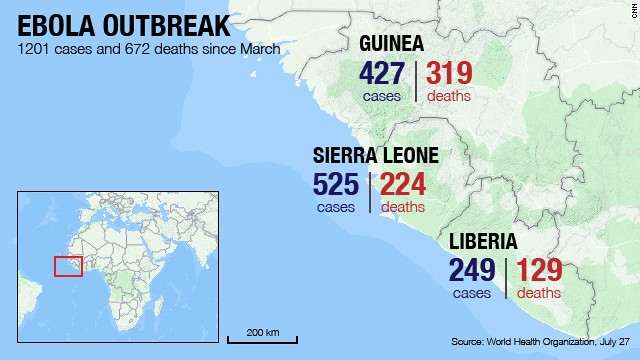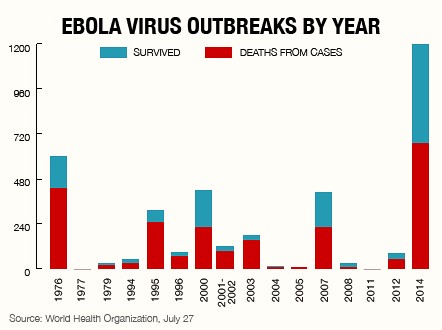Results 1 to 1 of 1
Thread Information
Users Browsing this Thread
There are currently 1 users browsing this thread. (0 members and 1 guests)
-
07-31-2014, 08:07 PM #1
Ebola Infected Americans in Liberia Coming to Atlanta Hospital for Treatment
Source: Flight leaves for Liberia to evacuate Americans infected with Ebola
By Chelsea J. Carter, Ben Brumfield and Jacque Wilson, CNN
updated 6:18 PM EDT, Thu July 31, 2014
CNN) -- A U.S.-contracted medical charter flight left Cartersville, Georgia, Thursday to evacuate two American charity workers in Liberia infected with Ebola hemorrhagic fever, a source told CNN. A CNN crew saw the airplane, a long-range business jet, depart shortly after 5 p.m. ET. The plane matched the description provided by the source, who spoke on condition of anonymity.
It was not immediately known when the two Americans -- identified as Dr. Kent Brantly and Nancy Writebol -- would arrive in the United States, or where the plane would land.
At least one of the two will be taken to a hospital at Emory University, near the headquarters of the U.S. Centers for Disease Control and Prevention in Atlanta, hospital officials told CNN's Dr. Sanjay Gupta.
Brantly and Writebol are described in stable but grave condition, with both reportedly taking a turn for the worse overnight, according to statements released Thursday by the faith-based charity Samaritan's Purse.
Experimental serum
The news follows reports that an experimental serum was administered to Writebol. Only one dose of the serum was available, and Brantly asked that it be given to his colleague, said Franklin Graham, president of Samaritan's Purse.
With word of the experimental serum, there were more questions than answers: What is it? Why was there only one dose? And why was it only made available to the American charity workers?
Samaritan's Purse said it did not have any additional detail about the serum.
There is no known cure or vaccine for Ebola, which the World Health Organization says is believed to have infected 1,323 people in the West African nations of Guinea, Liberia, Sierra Leone and Nigeria between March and July 27.
Of those suspected cases, it is believed to have been fatal in at least 729 cases, according to the health organization.
It is believed to be the worst Ebola outbreak in history, and even in a best-case scenario, it could take three to six months to stem the epidemic in West Africa, Dr. Thomas Frieden, director of the CDC, told reporters on Thursday.
The outbreak also prompted the CDC to issue a warning against all "nonessential" travel to the countries coping with an outbreak, Frieden said.
Writebol gets 'experimental serum'
Both Brantly, a 33-year-old who last lived in Texas, and Writebol were caring for Ebola patients in Liberia, both affiliated with Samaritan's Purse.
Meanwhile, Brantly received a unit of blood from a 14-year-old boy who survived Ebola, the statement said. Brantly had treated the teen, it said.
It was not immediately clear what doctors hoped the blood transfusion would do for Brantly.
While blood transfusions have been tried before, Frieden told reporters no one really knows why some people survive and some don't.
Meanwhile, Writebol's husband, David, who is with the same mission as his wife, is near her, said their son Jeremy, who spoke with CNN's Chris Cuomo from the United States.
But she is isolated from him, and he has to wear head-to-toe protective clothing similar to a hazmat suit so that he does not contract a disease that starts out with similar symptoms as a strong flu but can end in internal bleeding and death.
"Mom continues in stable condition but it's very serious, and she's still fighting," her son said. "She's weak, but she's working through it."
 Map: The Ebola outbreak
Map: The Ebola outbreak
Liberian Information Minister Lewis Brown said his country could ill afford to lose health care workers like Writebol and Brantly.
"We join the families in prayers that they can come through this and become ... shining examples that, if care is taken, one can come out of this."
Another physician in West Africa was not so fortunate; Dr. Sheik Humarr Khan fell ill early last week while overseeing Ebola treatment at a Sierra Leone hospital and died days later.
Record death toll
The current death toll that is the highest on record with the World Health Organization and still growing.
"This epidemic is without precedent," said Bart Janssens, director of operations for Doctors Without Borders, also known as Médecins Sans Frontières, a group of medical workers nursing victims through the disease as it runs its course. "It's absolutely not under control, and the situation keeps worsening."
Ebola fears hit close to home

The rate of infection has slowed in Guinea, but it has increased in neighboring Sierra Leone and Liberia.
As infection accelerates, some aid groups are pulling out to protect their own.
Samaritan's Purse and the missionary group Serving in Mission have recalled all nonessential personnel from Liberia.
The Peace Corps announced Wednesday it is doing the same, removing its 340 volunteers from the three severely affected nations.
While there are no confirmed cases, a Peace Corps spokeswoman said two volunteers came into contact with someone who ended up dying from the virus.
Those Americans haven't shown signs of Ebola but are being isolated just in case. The spokeswoman said they can't return home until they get medical clearance.
Presidents doubling down
The swelling cases have prompted the heads of state of two countries to cancel travel plans on Thursday to direct their full attention toward fighting the outbreak of the virus that has crippled parts of Liberia, Sierra Leone and Guinea and stirred palpable concerns that it will spread around the region and the world.
Liberian President Ellen Johnson Sirleaf and Sierra Leone's President Ernest Koroma both canceled trips to the United States, and Koroma declared a state of emergency. Koroma announced an action plan to tear down many barriers that international medical workers say they face while fighting disease.
Sirleaf said the country is in desperate need of people with expertise in treating and dealing with Ebola.
CDC workers are on the ground, she said.
"It's not enough because they are stretched thin," she said on CNN's "The Lead" with Jake Tapper.
Some residents in affected villages have accused medical workers of bringing the disease into the country and have barricaded their towns or otherwise blocked access to Ebola victims.
"The most challenging" aspect of trying to help people is that "we go into communities where we are not necessarily welcome," said Monia Sayah, a nurse with Doctors Without Borders.
People don't want to believe they or their loved ones have Ebola -- in part because "they understand now that the survival rate is not very high," she said.
Koroma said he will deploy police and military to accompany the aid workers.
They will search house to house for the infirm and enforce orders designed to curb the virus' spread.
American dies in Nigeria
One American, 40-year-old Patrick Sawyer, died in a Nigerian hospital earlier this month -- having come from Liberia. He was in a plane to Lagos, when he became violently ill. He was planning to go back home to Minnesota to celebrate his daughters' birthdays, but the disease took his life before he could.
The Nigerian government said Thursday it has located 10 more people who had contact with Sawyer, the first American who died in the Ebola outbreak. Meanwhile, none of the 67 people under surveillance and the two people in quarantine have shown symptoms of the disease, Nigerian Minister of Information Labaran Maku said.
A naturalized American citizen who worked in Liberia, Sawyer flew to Nigeria intending to attend a conference.
After exhibiting symptoms upon arrival July 20, he was hospitalized and died on July 25.
Nigeria's Minister of Health Onyebuchi Chukwu says the government is still searching for more people that had contact with Sawyer on his journey on a plane that stopped in Accra, Ghana and Lome, Togo, before traveling on to Lagos.
As of now, the outbreak has been confined to West Africa. But it could spread via travel, especially since people who have Ebola may not know it; symptoms usually manifest two to 21 days. Further complicating matters, signs of Ebola include fever, headaches, weakness and vomiting -- symptoms that also define many other ailments, from malaria to the flu, that Brown notes often pop up "at this time of year."
http://www.cnn.com/2014/07/31/health...eak/index.html
Similar Threads
-
Deadly Ebola outbreak in Congo (Coming here soon ?)
By JohnDoe2 in forum illegal immigration News Stories & ReportsReplies: 7Last Post: 10-06-2014, 10:09 PM -
Immigrants lose lawsuit against Atlanta Hospital
By RedStateVoter in forum General DiscussionReplies: 5Last Post: 12-17-2009, 08:07 PM -
Immigrants Lose Lawsuit Against Atlanta Hospital
By Jean in forum illegal immigration News Stories & ReportsReplies: 3Last Post: 12-16-2009, 06:44 AM -
2/3's of Atlanta Hospital's Dialysis Patients Are Illegal
By Texas2step in forum illegal immigration News Stories & ReportsReplies: 5Last Post: 09-16-2009, 09:02 PM -
Feds to pay hospital treatment for illigals..
By HandGrip in forum illegal immigration News Stories & ReportsReplies: 1Last Post: 05-10-2005, 12:08 PM


 LinkBack URL
LinkBack URL About LinkBacks
About LinkBacks




 Reply With Quote
Reply With Quote

AFRICAN MIGRANTS COMPLAIN AT NYC TOWN HALL OVER FREE FOOD AND...
04-17-2024, 11:49 PM in Videos about Illegal Immigration, refugee programs, globalism, & socialism